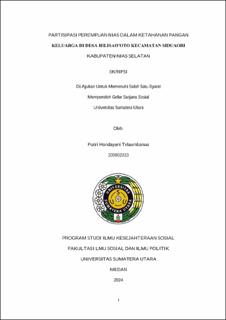| dc.description.abstract | This research has a phenomenon, namely that Hilisao'oto village is one of the villages on Nias Island, Siduaori District, South Nias Regency which depends on agriculture as a source of income. Nias women's participation in agriculture is very large, especially in family food security. Nias women in Hilisao'oto village work as farmers managing food crops from the beginning of opening, planting, maintaining the land until harvesting and can be consumed and act as housewives. Women's participation in family food security has an impact on the physical health of Nias women and the psychological health of Nias women due to cultural construction. This research aims to find out how participation is and what are the supporting and inhibiting factors for Nias women's participation in family food security in Hilisao'oto Village, Siduaori District, South Nias Regency. The research method used by the author in this research is a qualitative method, with a case study approach. The data collection techniques used are interviews, observation and documentation, this method focuses on an existing problem. The research results show that Nias women's participation in food security is very large, almost all activities to increase food security are carried out by women, especially housewives in Hilisao'oto village, Siduaori District, South Nias Regency. There are four aspects of Nias women's participation in food security, namely: (1) Food Availability, (2) Food Accessibility, (3) Food Safety, and (4) Food Utilization. The author's advice to Nias men is to treat women fairly, help women improve and provide food for the family, then to the village head to help provide education about the importance of treating women fairly, help women improve family food security, provide training or mentoring. to Nias women, especially housewives in Hilisao'oto village, Siduaori District, South Nias Regency regarding how to improve skills in agriculture, providing financial or non-financial support to women in accessing sustainable agricultural resources, and to Nias women in particular Housewives in Hilisao'oto Village, Siduaori District, South Nias Regency, researchers provide suggestions for building a collaborative network with family members, neighbors and local village heads to increase family food security. | en_US |


